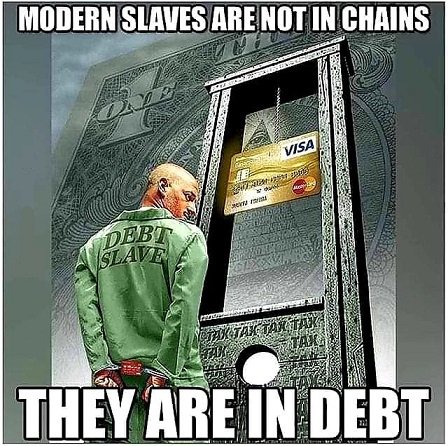
As the world awkwardly transitions into the Age of Aquarius... I have some questions. Society is broken in so many ways, but also has seemingly limitless potential swirling around the storm clouds of the future. Is the way that we are doing things today going to be completely untenable in the future? Judging by the way things are going, the snowball of unsustainability is already scary big and only getting exponentially larger.
Debt debt debt!
Debt is a great thing. It allows us to acquire something today that we might not have been able to afford for weeks, months, or even years of saving up. Debt has become the foundation of society, with the entire financial system resting wholly on its shoulders. Businesses and other investment ventures could not be started without it in many cases. Even all fiat currency itself is debt to be paid back to the bank.
Of course the other side of this reality are the pitfalls of owing another entity money. One wrong move and the collateral, whether it be car or house or business, is suddenly owned by the bankers should the debt be defaulted on. Unsecured debt in the form of credit cards and whatever else can also be a huge burden on the general population. Just look at current interest rates. I think I saw them up to 30% at this point, a bad sign indeed considering that a few decades ago 15% would have been considered a bit high.

But will this continue to be necessary?
As it stands right now in this moment it would be completely unthinkable to eliminate debt from the economy. Cue the ending of Fight Club in which all the skyscrapers are being demolished or the main storyline of Mr. Robot. It's a fantasy that seems to float around the collective mind but can't actually happen within the current environment.
However, will that always be the case?
If any piece of infrastructure has the answer to these questions, it's crypto. I can't help but remind myself that Bitcoin is still on that exponential trajectory. Does debt make sense if Bitcoin and friends can keep going +100% (or even +50%) per year? $1 becomes $1000 within such a system after ten years. After 20 years that becomes a million dollars, and after 30 years it becomes a billion. Why would anyone have a credit card if the money they control already has a high enough value to accomplish anything they wanted to do?
The question we have to ask ourselves is a pretty simple one. Is that kind of gain sustainable or even possible? The rational mind must deny it because the rational mind can not comprehend the exponential scale. However, when we factor in the completely squandered potential of this reality maybe these things could self-actualize after all.
$1 of BTC could never be worth $1B after 30 years.
This should be obvious. Either one of two things would happen. USD could hyperinflate into oblivion and $1B would be a meaningless number in terms of current value. In this case it would no longer even be seen as a unit of account and we'd stop using it as a measurement entirely. Meaning crypto would kill fiat entirely and it would cease to exist.
The other outcome is that the economy gets hit by the ton of bricks that is deflation, not inflation. In this case the $1 worth of Bitcoin wouldn't be actually worth $1B after 3 decades, but it would be able to buy $1B worth of product by today's standards. Meaning things that exist today would be nearly free within this context (assuming the person in question has any money whatsoever).
Near free everything?
Well I mean if most production is automated and energy is near infinite... doesn't it make sense? Why would you pay for food if your community makes food for free and gives it away? Why would a phone cost $800 if the entire company was run by AI? The easier it is to produce something the more competition will drive the price down. That's just basic economics. You don't have to buy a product if you can 3D print it yourself.
The real problem is distribution
If all the work as automated then how are people making money? The traditional economy assumes that market participants are doing something of value that feeds back into a positive feedback loop. That feedback loop is being broken by automation and technology. It doesn't matter if an apple costs 1 penny if people don't actually have a penny to pay for it. That's a very likely scenario in a hyper-deflationary economy. The gap between the rich and the poor will continue to reach more and more absurd levels every year. Instead of live getting easier it just gets harder or stays exactly the same even with mindblowing tech being invented every year.
The one-two punch
So not only must tech, automation, and AI drive the price of everything to near zero, but also we need an entirely new value distribution system to give citizens access to the new grid that's being built. Crypto is the only solution unless someone considers bootlicking for UBI the way to go. Either way money will basically have to be given away for things that would have never been considered to have value before then.
How do we earn money when 90% of the jobs no longer exist? Even the jobs that do exist today have dwindled to oblivion. Nobody gets a pension anymore. Social Security is a joke. There are states that legally don't allow one to pump their own gas to "create jobs". What kind of job is that? It's a made up job that should have never existed in the first place. Soon enough even that may be done by automation everywhere. It's simply not sustainable; a bandaid on a festering wound.
Conclusion
If you and everyone you knew had millions of dollars of value at their fingertips, why would anyone need a loan from a bank? The ultimate problem I'm seeing in crypto are toxic concepts like "wife changing money" and "generational wealth" that heavily imply that the crypto users of today will be the new overlords of tomorrow. "Wife changing money" can't exist unless women are poor and desperate. Generational wealth can't exist unless the financial environment of the future is just as unfair and tilted then as it is now. Many people are hypocrites, and we should be looking for another way that benefits everyone instead of an elite minority.
Money by itself means nothing. Money is simply a reflection of what society can offer in exchange for it. Without production, logistics, and service, money becomes worth less than the paper it's printed on. Only with a combination of technologies all coalescing together can these problems be truly solved. The money is worthless without the product and the product is worthless without the consumer. Does any of this mean we can kill the debt-based system? That is yet to be seen.

